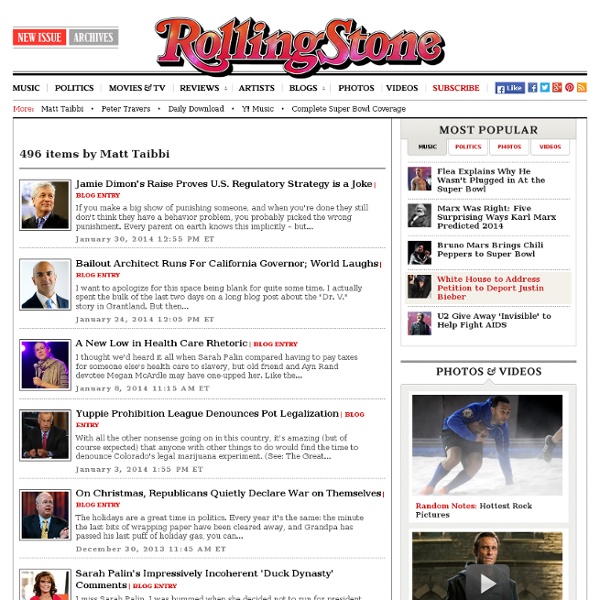Political News, Matt Taibbi, Politics, Issues and More
Thank You, Rolling Stone | BLOG ENTRY Today is my last day at Rolling Stone. As of this week, I’m leaving to work for First Look Media, the new organization that’s already home to reporters like Glenn Greenwald, Jeremy Scahill and Laura Poitras. I’ll have... February 20, 2014 10:35 AM ET Ex-Morgan Stanley Chief Jams Foot in Mouth, Complains of CEO Abuse | BLOG ENTRY There's a ton of interesting stuff going on in the Wall Street sphere of late – I'm trying to find some time to do a proper write-up of the extraordinary lawsuit just filed by the Better Markets... February 13, 2014 5:30 PM ET The Vampire Squid Strikes Again: The Mega Banks' Most Devious Scam Yet | ARTICLE Call it the loophole that destroyed the world. Democrats Must Stop Ted Cruz's Hollywood Ending | BLOG ENTRY Having lived in the former Soviet Union for 10 years, I will forever have plastered to the back of my cerebellum the commemorative bumper sticker: "WWSD?"
Techmeme
Roll Call
Economics and Politics by Paul Krugman - The Conscience of a Liberal - NYTimes.com
TechCrunch
In 2000, Too Many Liberals Told Themselves Election Didn't Matter. Will The Same Thing Happen In 2012?
The presidential election of 2000 still makes me angry. Mostly that’s because of the grotesque way it ended, with five Republican-appointed Supreme Court justices shutting down the Florida recount. But partly that’s because of the liberal apathy that first put the outcome into doubt. Throughout the campaign, plenty of liberals told themselves the election didn’t really matter, because the differences between the two candidates weren’t that stark. History proved that these liberals were wrong. That is why I hope every progressive and, really, every concerned citizen will read the latest issue of the Washington Monthly. The authors – including Dahlia Lithwick, Dave Weigel, and frequent TNR writer Harold Pollack – generally assume that Republican presidential candidates are serious about the promises they make on the campaign trail. Update: Readers are having a terrific debate about these issue in the comments section.
The Rude Pundit
SEO Blog
Wrastlin With The News The current presidential cabinet includes a WWE co-founder & this passes for modern political discourse: #FraudNewsCNN #FNN pic.twitter.com/WYUnHjjUjg— Donald J. Trump (@realDonaldTrump) July 2, 2017 CNN promised vengeance. Something To Believe In The pretense of objectivity has been dropped: These reporters aren't ideologues. The WSJ, typically a right-leaning publication, is differentiating their coverage of the president from most other outlets by attempting to be somewhat neutral. The news is fake. "I think the president is probably right to say, like, look you are witch-hunting me. And, since people need something to believe in, there are new American Gods: "A half hour of cable news delivers enough psychic trauma for a whole year. Current Headwinds for Online Publishing I struggle to keep up with the accelerating rate of change. Some of this stuff is cyclical. Speaking of robot journalists, check out the top 3 results for this query. Is this a test, @Google?
Related:
Related:



